New India-Japan Partnership Targets AI Innovation and Economic Security
In a bold geopolitical stride, A historic agreement on economic and technological security is being signed by India and Japan to protect supply chains for pharmaceuticals, semiconductors, artificial intelligence, clean energy, and rare minerals. It is scheduled to be the main event of Prime Minister Modi's crucial trip to Japan from August 29-30, so the timing is not coincidental. This pace comes at a time when global supply chains are being redrawn, and nations are racing to secure tech independence. It signals that India and Japan are ready to lead, not follow, in shaping the new digital economy.

At its core, the deal fuels an AI Innovation Bridge, linking India’s rising startups with Japan’s global tech giants. Together, they’re poised to accelerate breakthroughs in AI automation and next-gen digital ecosystems, rewriting the rulebook on cooperation. This bridge isn’t just symbolic; it’s a launchpad for joint research, funding, and market expansion. It ensures that both nations can ride the AI wave together while setting their own standards for innovation.
Adding to the drama, Modi might move to Sendai, the center of Japan's semiconductor sector, which is home to innovative giants like Toshiba, Sony, Renesas, and Kioxia. This is a blueprint for semiconductor dominance in a time of chip wars, and it conveys more than just optics. A visit here symbolized India’s intent to plug directly into Japan’s chip ecosystem. It could pave the way for fresh joint ventures and knowledge sharing in advanced electronics.
The agenda at the 15th India-Japan Annual Summit includes topics such as defense, clean technology, and strategic global alignment, as well as economics. The agreement is not merely a policy; rather, it is a brilliant move to fortify partnerships in a world where trust and technology are essential. The summit will likely set the tone for how Asia balances growth with security in the next decade. It also reaffirms India and Japan’s role as anchors of stability in the Indo-Pacific.
This collaboration also positions both nations as counterweights to global supply chain risks, particularly amid rising competition with China and the West. By pooling their expertise, India and Japan are not just reacting to global trends; they are actively setting them. It's a clear statement that resilience is as critical as growth in today’s volatile world. Both countries are signaling that their alliance is built to withstand global turbulence.
This agreement is about more than just economics. In the coming decades, technological leadership will determine global power, and India and Japan are committed to leading the technological revolution.